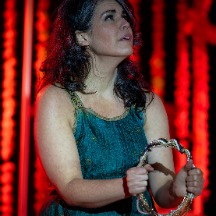Both “The Return of Ulysses” and “Nightsong of Orpheus” had non-European cultural elements that had been fused into the very European source material to 1) highlight some of the hidden non-European roots that were suggested by the source material but made invisible by time or 2) see what might be learned by the comparison with a different culture's perspective that we might otherwise not notice. I had enjoyed both productions immensely.
Parallels to the times that we are currently living in are unavoidable.
“Poppea,” though, is a strange show. The music in this opera is pretty sounding and showy beyond what is strictly necessary. It's extravagantly ornamented with harmonies in major keys that are fun to listen to. (It's worth noting that we are used to thinking of music in major keys as projecting an almost hummable happiness).
On top of this dazzling framework is played a story that is a complicated mixture of sex, corruption, and killing that begins to play like the Epstein, Ed Buck, and P. Diddy scandals of the present day (even though it would be a PG-rated production).
The show ends with a remorseless and blithely delivered murder. That's not really a spoiler. Even with that hint, I promise you won't see it coming.
The title character is the woman Poppea. But the show is a steely-eyed portrait of the perversity of the narcissistic, repressive, oligarchical ruler Nerone, who has gone out of control. (You are familiar with Nerone under the name of Nero - the Emperor who fiddled while Rome Burned.)
Parallels to the times that we are currently living in are unavoidable.
Director Timothy Nelson has added music (written by Ani Dang and Rajna Swaminathan) and dances from the southern Indian tradition choreographed by Hari Krishnan to Monteverdi's composition. (The Dancers were Yasseen Hassan, Tenesha Hunter, and Chitra Subramanian.)
One of the most evocative moments in the show was Hassan's passionate percussive dance. This dance embodies the process that the philosopher Seneca goes through as he embraces death at his own hand due to a command issued by the Emperor. The singers in this production have strong, agile voices whose force was underscored by the delayed reverberation generated in the Dupont Underground in Washington, DC, where they performed the show.







